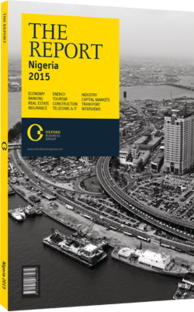Banking
The Company
Guaranty Trust Bank, with its many businesses covering Anglophone West Africa and the UK, has grown into one of Nigeria’s most respected and service-focused banks. The bank, along with its subsidiaries, is organised into three business segments: retail, corporate and commercial. It currently has over 29.43bn shares outstanding, translating to a market capitalisation of more than N763bn ($4.7bn). Its asset base has grown to about N2trn ($12.2bn), with a shareholders fund of over N200bn ($1.2bn). In 2007, the bank became the first Nigerian financial institution to undertake a $350m “regulation S” eurobond issue and a $750m global depositary receipts offer. The bank is rated “B+” by Fitch and Standard & Poor’s, a reflection of its stability and reputation as a well-established franchise with strong asset quality and consistently strong performance. In December 2013 the company announced it had completed its acquisition of a 70% stake in Kenya’s Fina Bank, which has subsidiaries in Uganda and Rwanda.
Financial Performance
As of the third quarter of 2014, Guaranty continued to deliver impressive returns, despite ongoing challenges in Nigeria’s banking industry. The management’s strategy of sustaining investment in innovative, quality products in recent years has led to further gains in market share. Gross earnings grew by 9.48% in Q3 2014 to N52.6bn ($320.9m), while net interest income came in at N105.34bn ($642.6m). Operating income equalled N155.12bn ($946.2), while pre- and post-tax profit declined marginally to N80.70bn ($492.3m) and N66.74bn ($407.1m), respectively. Earnings and profitability were pressured as a result of growth in operating expenses and provisions for customers. Given the resources available to it, Guaranty leads its peers in efficiency. However, its costs increased by 11.30% year-on-year in Q3 2014 to N68.14bn ($415.7m), translating to a cost-to-income ratio (CIR) of 43.92%, up from 41.85% in 2013. The growth in operating expenses is a result of taking on over 400 new staff from newly acquired subsidiaries in Kenya, Rwanda and Uganda and an increase in CIR at a few subsidiaries. Other factors include AMCON Levy (on a larger total assets base) and growth in depreciation and amortisation charges. Profit before and after tax compressed during the period to 40.50% and 33.50%, respectively, as a result of an increased proportion of its loan book being denominated in dollars as well as lower yields on assets. While the impact of regulation took a toll on returns, the bank was able to maintain a return on average equity of 26.37%, compared with an 18% industry average. Its loan book grew 15.45% year-to-date (YTD) to N1.16trn ($7.1bn), while deposits rose by 8.45% YTD to N1.55trn ($9.5bn) as the bank continued its aggressive low-cost deposits mobilisation despite rising interest rates. Total assets in Q3 2014 increased 6.30% to N2.24trn ($13.7bn), while net assets grew 3.11% YTD to N342.67bn ($2.1bn). Guaranty remains focused on exploiting its lead in financial services. A potentially significant catalyst to its near-term growth will be a larger customer base due to its sought-after e-banking platforms following the start of the central bank’s cashless policy.
Development Strategy
Guaranty’s growth strategy is to be one of the top three banks in Africa by 2016 by absolute profitability. The bank is well-positioned to grow its market share across the Nigerian banking space. In line with its new focus on African expansion, the bank intends to scale up its franchise in Africa. Following divestment from its non-banking subsidiaries, Guaranty has launched its expansion into Francophone West Africa with the opening of its first branch in Côte d’Ivoire. The recent acquisition of a 70% share in Kenya’s Fina Bank is in line with the bank’s overall expansion strategy. In addition, management remains committed to its goal of bringing the CIR to below 45% by 2016. We maintain that Guaranty remains a value-driven and defensively positioned option for investors, and its ability to deliver on key financial goals continues to support this position.
You have reached the limit of premium articles you can view for free.
Choose from the options below to purchase print or digital editions of our Reports. You can also purchase a website subscription giving you unlimited access to all of our Reports online for 12 months.
If you have already purchased this Report or have a website subscription, please login to continue.

